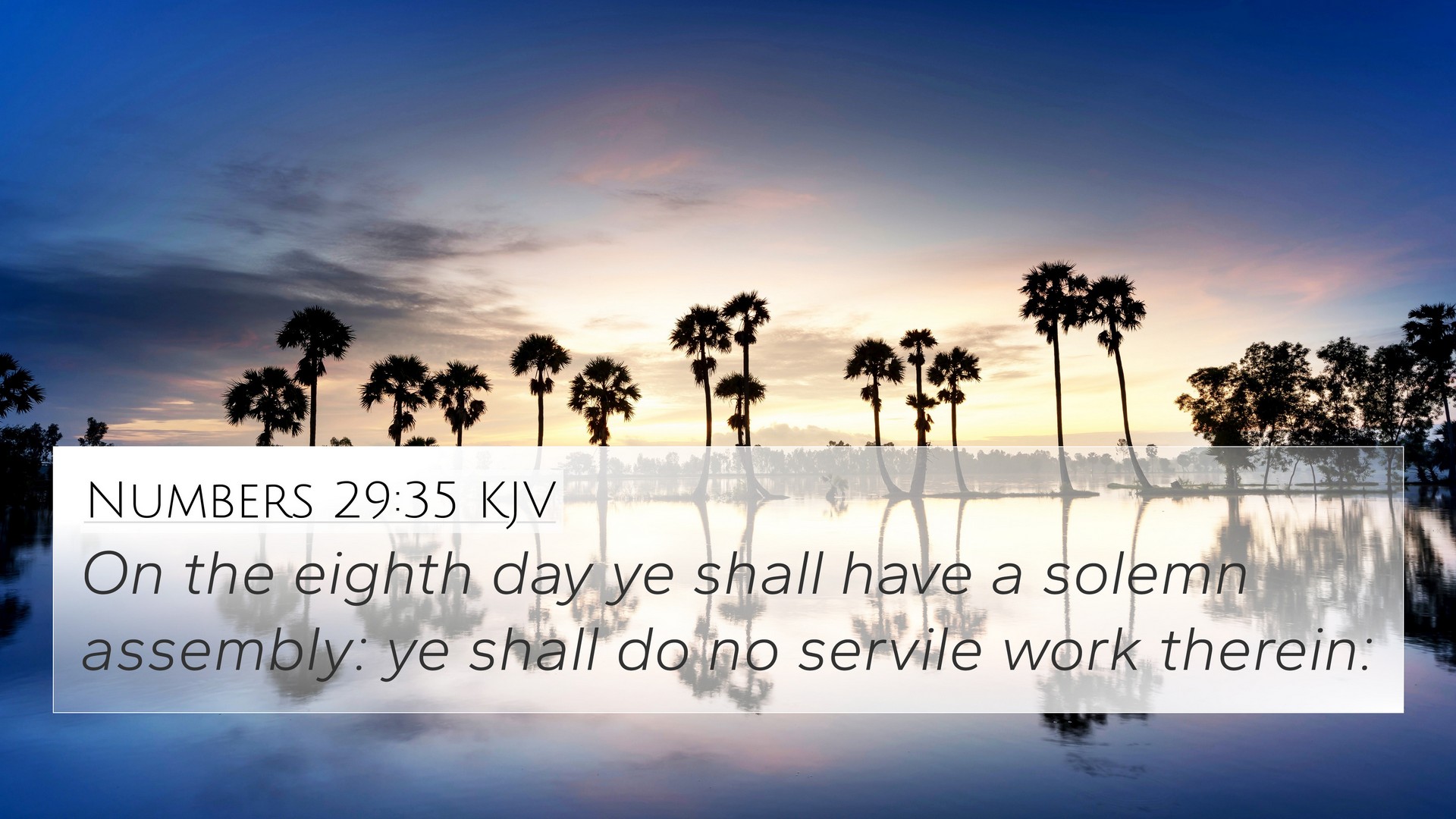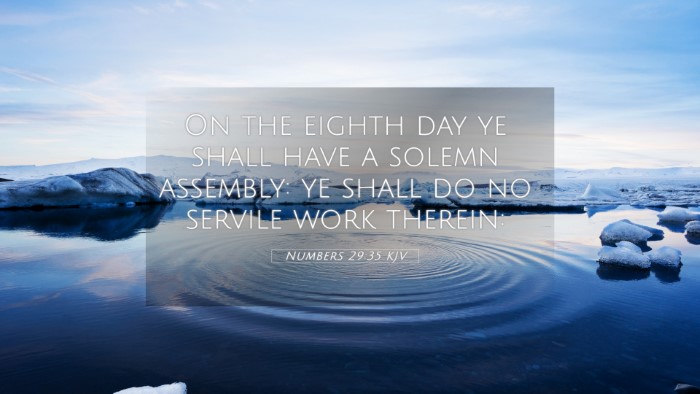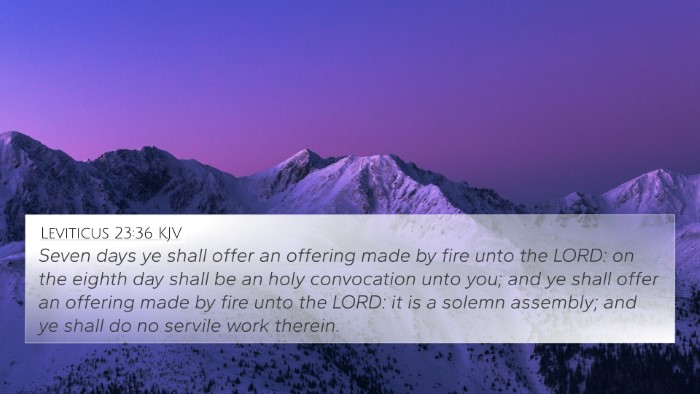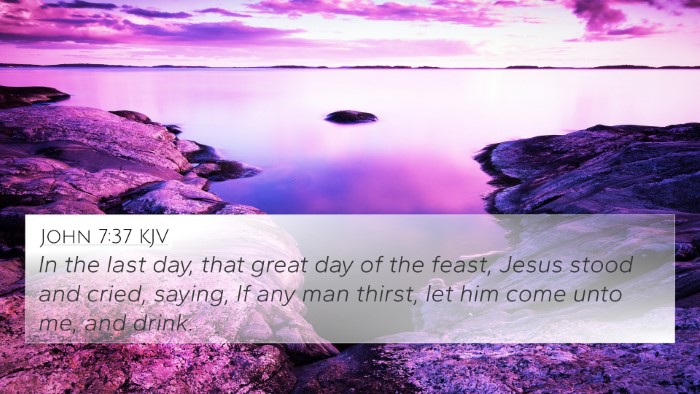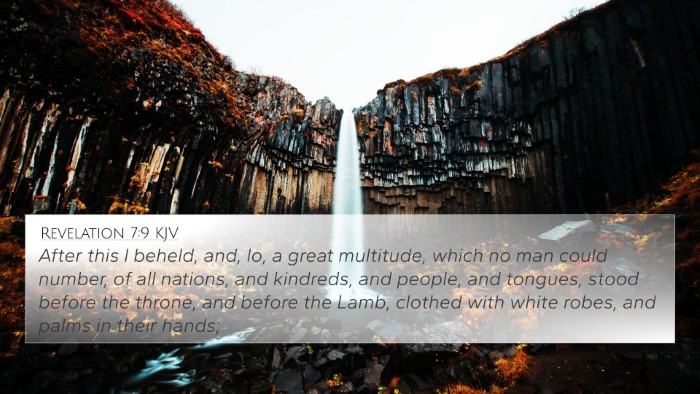Understanding Numbers 29:35
Verse: "On the eighth day you shall have a solemn assembly; you shall not do any ordinary work." (Numbers 29:35)
Overview of the Verse
Numbers 29:35 concludes the instructions concerning the Feast of Tabernacles, highlighting a day of worship and rest following the festival. This verse encapsulates the importance of setting aside time for religious observance, emphasizing both solemnity and the cessation of mundane activities.
Summary of Commentary Insights
Matthew Henry's Commentary
Henry emphasizes the significance of dedicating the eighth day as a special assembly, which symbolizes a new beginning and an opportunity for spiritual renewal. He points out that the observance of this day encourages believers to focus on God, reflecting a theme found throughout scripture regarding the importance of corporate worship and rest.
Albert Barnes' Notes
Barnes notes that the regulations set forth in Numbers are designed to cultivate a sense of community and reverence among God’s people. The instruction to refrain from ordinary work reinforces the principle that spiritual duties should take precedence over daily concerns, a theme echoed in other parts of the Bible.
Adam Clarke's Commentary
Clarke highlights that the eighth day signifies a complete cycle in Jewish tradition, representing resurrection and new beginnings. His analysis indicates that this day serves not just as a conclusion to the festival, but as an invitation to embrace renewal in one's spiritual life, drawing parallels to other Biblical concepts of rest and holy observance.
Connections Between Bible Verses
This verse illustrates the overarching Biblical theme of rest associated with divine appointments. Below are notable cross-references that highlight this theme:
- Leviticus 23:36 - This verse discusses the calling of a holy assembly on the eighth day, linking it closely to the observances in Numbers.
- Deuteronomy 16:8 - Emphasizes the requirement of rest during festivals, reinforcing the sanctity of designated days of worship.
- Exodus 20:8-11 - The commandment to keep the Sabbath; this establishes the precedent for setting aside time for God.
- Hebrews 4:9-10 - Discusses the concept of rest from a New Testament perspective, concluding that a Sabbath rest still remains for the people of God.
- Matthew 12:8 - Jesus declares that He is Lord of the Sabbath, revealing the purpose of rest as relational rather than merely ritualistic.
- John 7:37-38 - Ties into the themes of the Feast of Tabernacles, illustrating the living water Jesus offers that fulfills the symbolic gestures of the feast.
- Colossians 2:16-17 - Here, Paul refers to the festivals, suggesting they are a shadow of the things to come, with Christ being the substance.
Thematic Connections
Alongside specific cross-references, Numbers 29:35 invites thematic Bible verse connections:
- Worship and Community: The idea of gathering as a community for worship is reinforced throughout the New Testament (e.g., Acts 2:42).
- Rest in God: The theme of rest as a divine command is prevalent in both the Old and New Testaments (e.g., Exodus 31:15 and Matthew 11:28).
- Celebration and Remembering: Festivals and reminders of God’s faithfulness are pivotal in both Testaments (e.g., Deuteronomy 16:12).
Practical Applications for Cross-Referencing
For those studying the Bible, understanding Numbers 29:35 and its connections can enhance one's insights into both the Old and New Testaments. Here are some tools and methods for effective cross-referencing:
- Bible Concordance: Utilize a Bible concordance to find themes and specific phrases across scriptures.
- Cross-Reference Guides: Many study Bibles provide cross-reference systems that facilitate tracing thematic lines.
- Chain Reference Systems: Following thematic chains within the scriptures allows for deeper understanding of related verses.
- Timelines: Creating a timeline can reveal how themes like rest and worship have developed throughout salvation history.
Conclusion
Numbers 29:35 serves as a poignant reminder of the necessity to rest and worship, a concept that permeates throughout the entirety of Scripture. By engaging in comparative Bible verse analysis and utilizing tools for cross-referencing, believers can uncover deeper theological truths and enhance their understanding of God's Word, fostering a richer spiritual experience.
Keywords Summary
In studying this verse, it is beneficial to explore topics such as Bible verse cross-references, connections between Bible verses, and thematic Bible verse connections. Learning how to use Bible cross-reference guides and Bible reference resources can greatly aid in your study. Tools for Bible cross-referencing are essential for anyone desiring to deepen their understanding of scripture.
Further Study Suggestions
Those interested in exploring the links between various Bible verses may consider studying:
- How to find cross-references in the Bible
- Identifying connections between Old and New Testament themes
- Cross-referenced themes in the Bible that pertain to festivals and divine observance
- Comparative studies between different books of the Bible and how they address rest and worship
- Utilizing Bible cross-references for sermon preparation and teaching purposes
